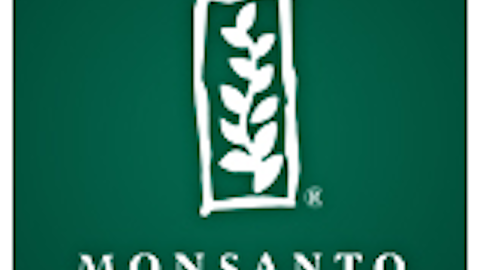While Africa has long been intransigent in its stance against introducing genetically modified crops, cracks are forming in the opposition, and the world’s leading biotechs — E I Du Pont De Nemours And Co (NYSE:DD), Monsanto Company (NYSE:MON), and Syngenta AG (ADR) (NYSE:SYT) among them — are poised to take advantage of the weakening stance and flood the market with seed, fertilizer, and pesticides. With Europe effectively closed off to GM crops, the seed and chemical giants are looking to Africa to be their next growth market.
To pave the way for choking off conventional seed stock and replace it with GM seeds, an African agricultural organization issued a report last week saying opposition in Africa to GM crops is a “farce” based on a “fear of the unknown.” Backed by the former head of the United Nations, Kofi Annan, and the Bill and Melinda Gates Foundation, the Alliance for a Green Revolution in Africa, or AGRA, says GM crops have been closely studied for decades and are no riskier than conventional crops.
The report goes on to note that only four African countries have permitted fully commercialized GM crops — Burkina Faso, Egypt, South Africa, and Sudan — and of those four, South Africa accounts for 82% of the total.
That’s why E I Du Pont De Nemours And Co (NYSE:DD)’s acquisition of South Africa’s largest seed company, Pannar, was seen as an important conquest. It gives the chemicals company a large handhold over maize, one of the most important crops on the continent, three-quarters of which is already genetically modified. E I Du Pont De Nemours And Co (NYSE:DD), through its Pioneer Hi-Bred division, now has control over one of the largest collections of genetic resources for the crop.
AGRA says enabling environments for adopting GM crops are being put into place. Five countries are conducting field trials of biotech crops — the final step before adoption — while most others have signed on to conventions and protocols that set the stage for adopting the necessary policy and regulatory “frameworks.”
If Africa does succumb to the siren song of GM crops, control of the food chain will be taken from the hands of the family farmer and placed into those of the agri-giants. No longer will the traditional practices of seed saving from one year to the next be permitted, but farmers will be forced instead to buy new seed from DuPont or Monsanto Company (NYSE:MON) each year, or at the least pay royalties. We’ve seen that here in the U.S., where Monsanto Company (NYSE:MON) has successfully sued farmers because they bought seed from third parties and then tried to grow crops afterwards without rendering royalties to the biotech.
Then starts a cycle of becoming ever more reliant on the herbicides and pesticides necessary to grow those crops. Why buy Monsanto Company (NYSE:MON)’s Roundup-resistant seed if you’re not going to spray the herbicide afterwards? Unfortunately, the overapplication of these chemicals is leading to the creation of superweeds and superbugs and have been linked with the destruction of the honeybee population. For farmers who wished to go back to the old ways, their fields would have to lie fallow for years before the chemicals poured onto them were gone, a practical impossibility when the harvests are used for subsistence.
Monsanto Company (NYSE:MON) withdrew bids to grow eight of nine genetically modified crops in Europe because of staunch opposition and will instead focus on conventional seed types. Syngenta AG (ADR) (NYSE:SYT) is now fighting the EU’s ban on its pesticide thiamethoxam, the neonicotinoids thought responsible for honeybee colony collapse disorder. Monsanto Company (NYSE:MON), Syngenta AG (ADR) (NYSE:SYT), and The Dow Chemical Company (NYSE:DOW)‘s AgriScience division have resorted to combating the anti-GMO sentiment rampant on the continent by creating a website dedicated to pushing its agenda and combating fears.
Perhaps the far easier solution is to look elsewhere for easier fish to fry — or turn into Frankenfood. The fertile, untapped potential of Africa is just such a place, and while local resistance to GM crops is mounting, the individual governing bodies may yet pave the way for their introduction. A new era of agricultural colonialism will be born where the local farmer ends up becoming enslaved to the global profit demands of corporate agriculture.
The article Monsanto’s Next Conquest for GMO Dominance originally appeared on Fool.com is written by Rich Duprey.
Fool contributor Rich Duprey and The Motley Fool have no position in any of the stocks mentioned.
Copyright © 1995 – 2013 The Motley Fool, LLC. All rights reserved. The Motley Fool has a disclosure policy.






